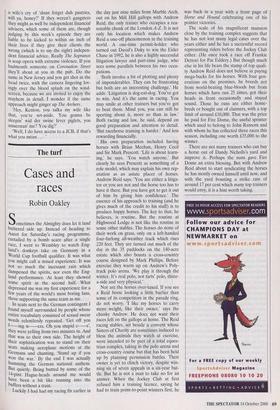The turf
Cases and races
Robin Oakley
In seats next to the German contingent I found myself surrounded by people whose entire vocabulary consisted of sexual swear words relentlessly repeated. 'Get off you
f----ing w ers. Oh you stupid c—s', they were yelling from two minutes in. And that was to their own side. The height of their sophistication was to stand on their seats making aeroplane motions at the Germans and chanting, 'Stand up if you won the war.' By the end I was actually humming the German national anthem. But quietly. Being butted by some of the 14-pint Hague-heads around me would have been a bit like running into the buffers without a train.
Luckily I had had my racing fix earlier in
the day just nine miles from Marble Arch, out on his Mill Hill gallops with Andrew Reid, the only trainer who occupies a rea- sonable chunk of the London A-Z. It is not only his location which makes Andrew Reid a one-off phenomenon in the training world. A one-time permit-holder who turned out David's Duky to win the Eider Chase in 1992, he is also a highly successful litigation lawyer and part-time judge, who sees some parallels between his two occu- pations.
`Both involve a bit of plotting and plenty of imponderables. They can be frustrating but both are an interesting challenge.' He adds: 'Litigation is dog-eat-dog. You've got to win. And it's the same in racing. You may smile at other trainers but you've got to beat them. Mind you, you can still be sporting about it, more so than in law.' Both racing and law, he said, depend on good preparation and attention to detail. `But racehorse training is harder.' And less rewarding financially,
' His own preparation included having horses with Brian Meehan, Henry Cecil and Sir Mark Prescott. 'Life is about learn- ing,' he says. 'You watch anyone.' But clearly he sees Prescott as something of a role model, which may explain his own rep- utation as an astute placer of horses. Andrew Reid says: 'You are either a litiga- tor or you are not and the horse too has to have it there. But you have got to get it out of him by giving him confidence.' The essence of his approach to training (and he gives much of the credit to his staff) is to produce happy horses. The key to that, he believes, is routine. But the routine at Highwood Lodge is not like the routine in some other stables. The horses do none of their work on grass, only on a left-handed four-furlong all-weather track which rises 220 feet. They are turned out much of the day in the 35 paddocks on the 140-acre estate which also boasts a cross-country course designed by Mark Phillips. Before exercise they warm up on Andrew's Poly- track polo arena. 'We play it through the winter. It's real polo, not tarts' polo, three- a-side and very physical.'
Nor are the horses over-taxed. If you see a Reid horse looking a little burlier than some of its competitors in the parade ring, do not worry. 'I like my horses to carry more weight, like their owner,' says the chunky Andrew. He does not want their races left on the gallops at home. The Reid racing stables, set beside a convent whose Sisters of Charity are sometimes induced to bless the animals they watch at exercise, were intended to be part of a total eques- trian complex, taking in the polo arena and cross-country course but that has been held up by planning permission battles. Their owner is yet to clinch victory, despite win: ning six of seven appeals in a six-year bat- tle. But he is not a man to take no for an answer. When the Jockey Club at first refused him a training licence, saying he had to train point-to-point winners first, he was back in a year with a front page of Horse and Hound celebrating one of his pointer victories.
The scale of his magnificent mansion close by the training complex suggests that he has not lost many legal cases over the years either and he has a successful record representing riders before the Jockey Club either. (He once took a race off Frankie Dettori for Pat Eddery.) But though much else in his life bears the stamp of top quali- ty Andrew Reid does not believe in paying mega-bucks for his horses. With four gen- erations on the premises, he breeds not from world-beating blue-bloods but from horses which have run 25 times, got their heads in front occasionally and stayed sound. Those he runs are either home- breds or bought out of claimers, with a top limit of around £10,000. That was the price he paid for Fire Dome, the useful sprinter which used to belong to John Ransom and with whom he has collected three races this season, including one worth £35,000 to the winner.
There are not many trainers who can buy a horse out of Dandy Nicholls's yard and improve it. Perhaps the nuns gave Fire Dome an extra blessing. But with Andrew Reid about to start syndicating the horses he has mostly owned himself until now, and with the yard boasting a strike rate of around 17 per cent which many top trainers would envy, it is a hint worth taking.


















































































 Previous page
Previous page